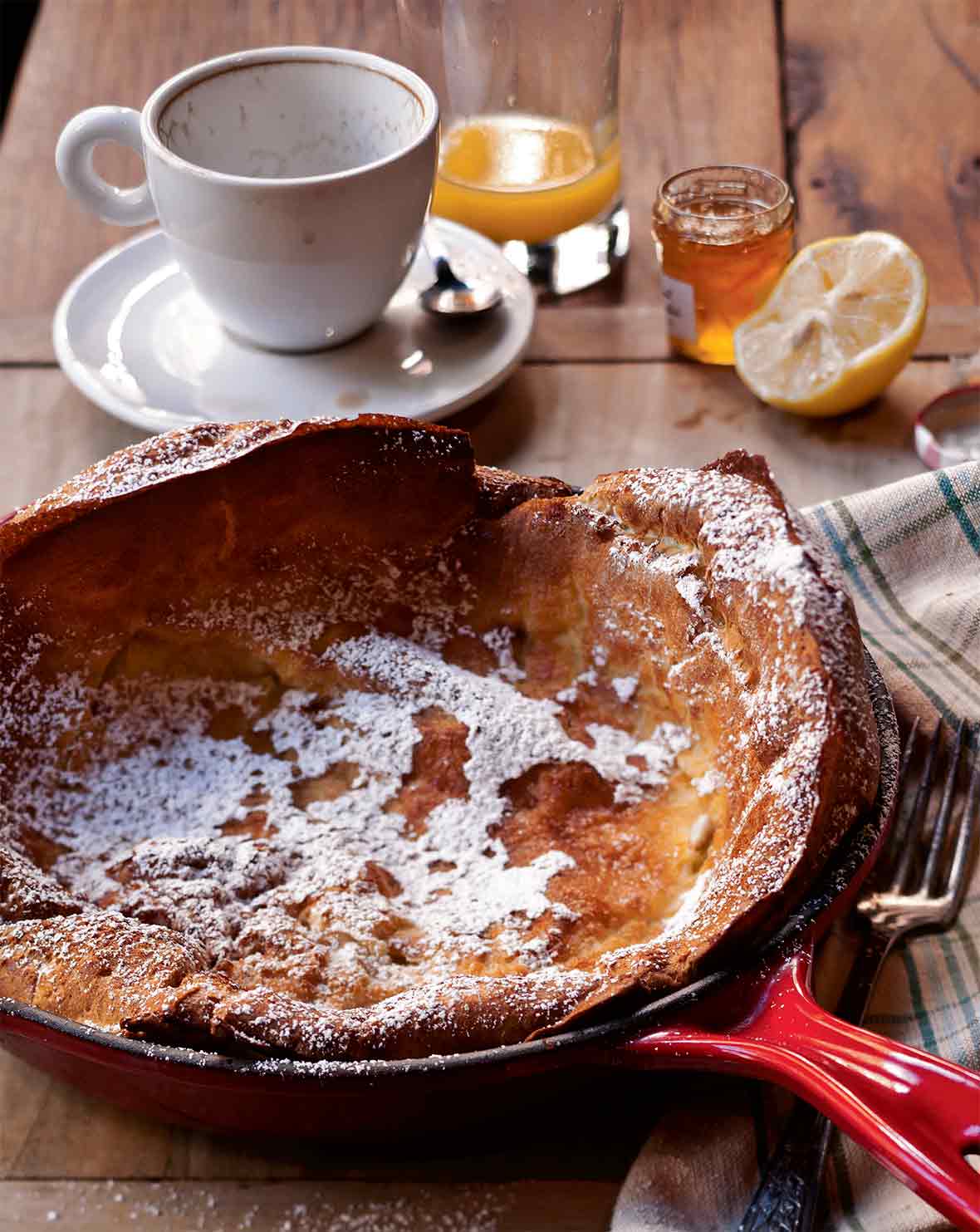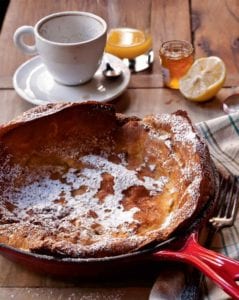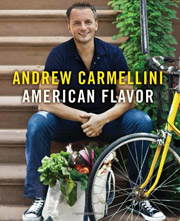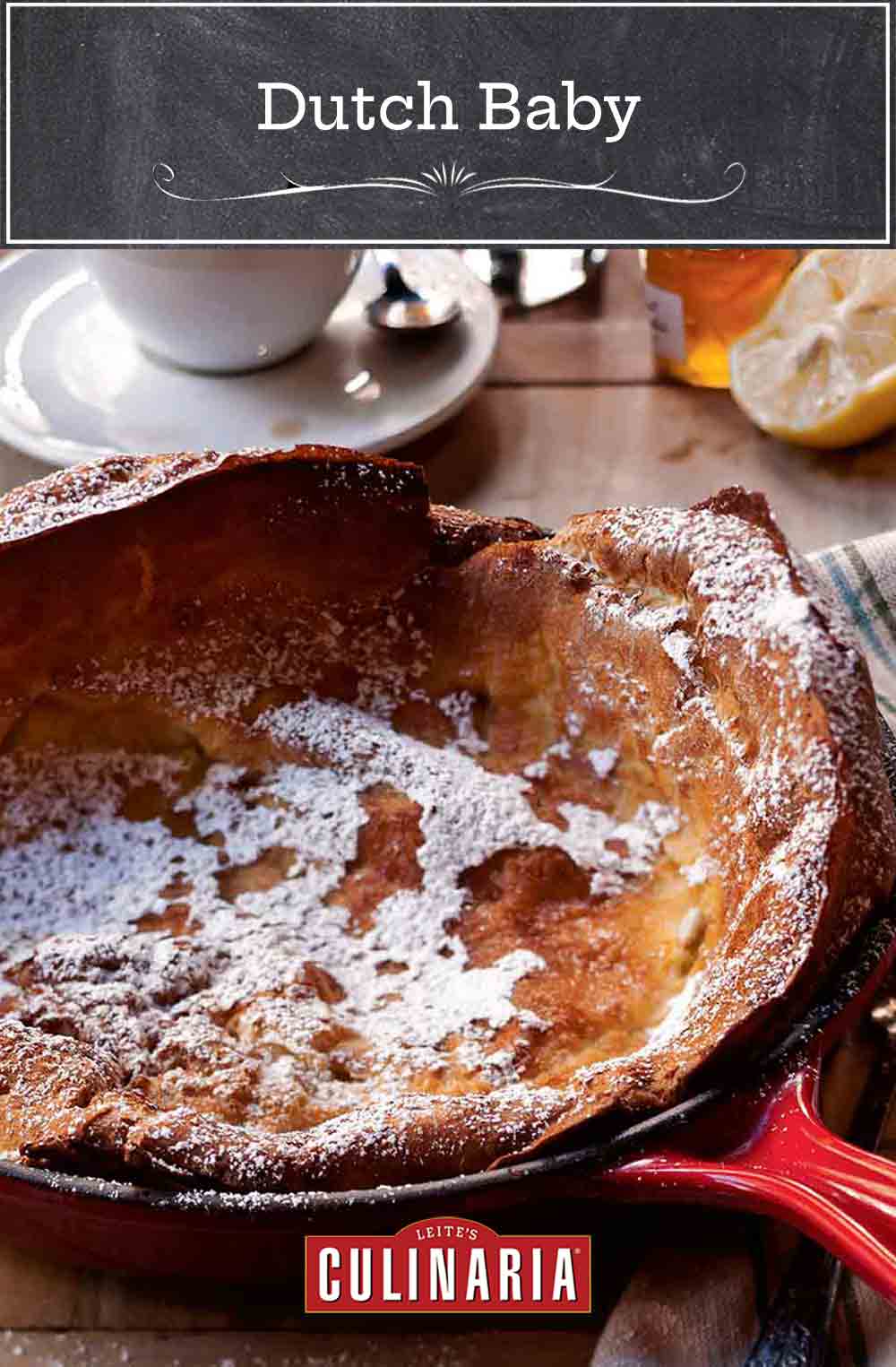
A Dutch Baby is simply another name for a German pancake. But neither of those names really do this skillet pancake justice. It’s essentially ethereal loveliness that’s crisp on the outside, airy and puffy on the inside. You can smother it with butter and maple syrup or dust it with confectioners’ sugar and squeeze a lemon over it. When I was eight years old, it was about as big as my head. It was the coolest thing ever. Take note that this recipe makes two servings. And that may not be ample for your breakfast table. We’d never dream of suggesting you skimp and dish up paltry portions, not when everyone who’s tried this pancake is lauding and applauding it as the best Dutch baby recipe they’ve ever experienced. So instead, just double the ingredients and divvy the batter between a couple skillets. Crisis averted. Originally published February 17, 2012.–Renee Schettler
What makes a Dutch baby rise?
You might notice that Dutch baby pancakes don’t have any leavening in them yet they still manage to achieve lofty heights. Like a Yorkshire pudding, these billowy beauties rely on steam to accomplish maximum puff. Two things that will help you make your Dutch baby dreams come true—enough air in a well-developed batter and a blistering-hot pan and oven. The suggested rest time in this recipe isn’t just to give you times to get the kids out of bed. Resting the batter will let the batter develop gluten that helps to trap that all-important steam.

Dutch Baby
Ingredients
- 2/3 cup milk
- 1/4 teaspoon vanilla extract
- 4 large eggs
- 2/3 cup all-purpose flour
- 2 teaspoons granulated sugar
- 1/4 teaspoon kosher salt
- 1 1/2 tablespoons (3/4 oz) butter, melted, plus more for the baking dish
- Butter, for the skillet
- Confectioners’ sugar, for dusting
- Maple syrup, butter, lemon wedges, and fruit compote
Instructions
- In a blender, combine the milk, vanilla extract, and eggs, and blend on medium-high until everything is combined, about 15 seconds. Leave the mixture in the blender.
- In a large bowl, whisk together the flour, sugar, and salt. Add the dry ingredients to the blender and blend again, just until combined. Add the melted butter and keep blending until everything is pretty darn smooth, maybe 30 seconds.
- Pour the batter into a bowl, cover it tightly with plastic wrap, and refrigerate for at least 6 hours. (The key to a good Dutch Baby is making the batter the night before. It needs to rest in the fridge for at least 6 hours; otherwise, it will be too eggy. That’s good news for your Sunday morning, as you can simply bake your Dutch Baby while you’re making coffee.)
- Preheat the oven to 400°F (204°C). Adjust oven rack to middle position.
- Butter a 10-inch ovenproof skillet, preferably cast-iron, and slide it in the preheating oven for about 5 minutes, until it gets pretty hot.
- When the skillet is properly heated, pull it out of the oven, pour in the batter, and slide it back in the oven. Bake for 15 minutes, then turn the skillet and bake for another 10 minutes or so, until the batter has risen high on the sides and a little bit in the center, and has turned golden brown right in the middle. You may want to watch it carefully, as the edges can get a little dark—that’s OK as far as we’re concerned, but if you prefer your pancake pale, you can always crimp a strip of aluminum foil around the edges.
- Pull the Dutch baby out of the oven and slide it right out of the skillet onto a plate. The pancake won’t stick to the skillet, although it will deflate as it cools down—there’s just no avoiding that.
- Fill a small sieve or strainer with confectioners’ sugar and shake it over the Dutch baby until the surface is thickly covered. Place the Dutch baby in the middle of the table with some little bowls of toppings: lemon wedges, fruit compote, pats of soft butter, maple syrup. You don’t need a knife and a cake lifter for this: just let everybody pull pieces off with their fingers. It will disappear FAST.

Nutrition
Nutrition information is automatically calculated, so should only be used as an approximation.
Recipe Testers’ Reviews
Can there be an easier, tastier recipe for breakfast? I doubled this Dutch baby pancake recipe and was actually able to make three pancakes. My toddler ate one alone, then the other three girls and I shared the other two. We didn’t even bother eating them with any of the sides, as they were perfectly amazing on their own with the sugar over them. What I loved about them is that they were not too sweet, fast to make, and great to eat both hot and cold.
I’ve made several Dutch baby recipes over the past years and enjoy how a simple make-ahead batter can transform into a crowd-pleasing breakfast or brunch dish. Sometimes in the past I’ve been disappointed that the final product was a little thin and not as filling as I would have liked. This recipe is the solution to my past concerns. It manages to be substantial without being too eggy. I will definitely be making this again.
I’ve made a version of this in the past. It was good but eggy. This recipe calls for the batter to sit overnight and it really makes a difference—it isn’t eggy. This is a fun recipe for adults and kids alike. It is extremely easy to make, with no special ingredients, and it comes out of the oven all puffy and then deflates. My tasters loved this Dutch baby and we will definitely have it again. It could have served three, not two, people.
Delicious and dramatic! At first I thought it wasn’t going to work, because my Dutch baby didn’t rise in the middle right away, but I waited and in the end it puffed up very nicely. We ate it with powdered sugar and a squeeze of lemon.
This is a great Dutch baby pancake recipe, and it’s nice that you can make it ahead and just bake it in the morning. It’s flavorful, with a rich, eggy taste. The recipe says it serves two, but it easily serve two adults and two children. One could modify the recipe by cooking sliced apples, butter, cinnamon, and sugar until it caramelizes in the pan before adding the batter—that’s yummy, too.
This recipe is a miracle. My boys constantly request pancakes or waffles when they’re both home, but I really adore spending time with them on these days rather than being stuck in the kitchen. Voila! A batter that is made the day before and cooks up in no time, leaving me free to enjoy my morning.
I used a 10-inch pan and my cooking times were 15 minutes, turn, and then 7 minutes. This was positively sumptuous served with a little Vermont maple syrup. No additional butter needed!
I’ve been eyeing this Dutch baby recipe for quite some time, problem is I usually eat fruit and yogurt for breakfast and need a good excuse to make something like this for the morning meal. With the kids around for a holiday break, I decided it was the perfect excuse.
I loved the fact that it could be mixed the night before and in minutes the next morning I had a gorgeous puffed pancake, reminiscent of the early days in a famous pancake restaurant.
I used my cast-iron skillet and found that the timing in the recipe was spot on. I did have to cover the quickly browning sides toward the end as I like my pancake pale. I was rewarded with a delicious Dutch baby that was large enough for several eaters to share. Yes, they still opted for their healthy breakfast but were so happy to indulge in a small piece of this delicious treat. It looked gorgeous with a snowy sprinkling of confectioners’ sugar. We ate it with real maple syrup on the side and we look forward to our next excuse to make it again.














Can I make it longer than six hours in advance? I’d like to make it this evening for tomorrow morning, so more like 10 hours in advance.
Also I’ve never used your recipe but the one I usually use I always add more eggs, like yours. ❤️
Yes, it should work very well to make the batter tonight. Please let us know how it turns out, Alanna.
Do you have to use a blender? I don’t have one. Thanks
Donnelle, one of the key factors in getting a Dutch baby to rise is incorporating enough air into the batter, which is where the blender comes in. You could try with a hand mixer or some very vigorous whisking and see if you can achieve the same result, but we haven’t tried doing this, so we can’t guarantee it will work.
Hi! I want to use this recipe for my 12 inch cast iron skillet, are there any recipe adjustments I should be making? This recipe looks amazing but I want to make sure it can feed 5 for mothers day!
Thank you!
Bianca, it should be fine in a 12-inch skillet. It will be a little larger, so it might not be as tall as if you’d made it in a 10-inch skillet, but you should still get a gorgeous, puffy Dutch baby. Do keep an eye on it for the last few minutes of cooking, as it may be done a couple minutes early. For 5 people, I’d double the recipe and do it in 2 batches.